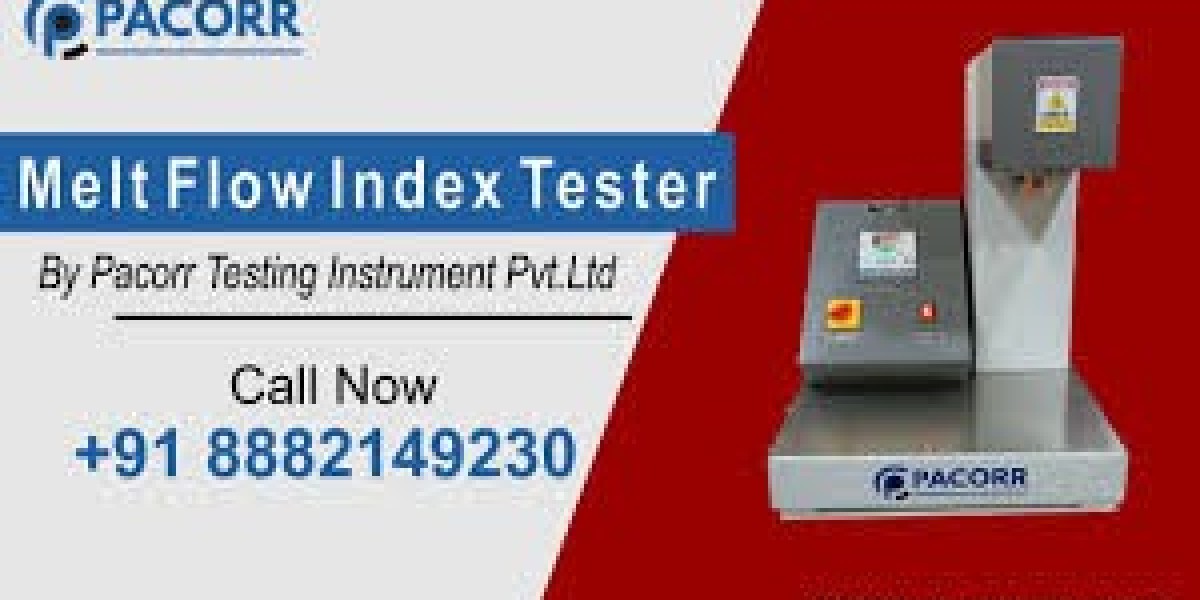About the Melt Flow Index Tester
The Melt Flow Index (MFI) Tester, also known as the Melt Flow Rate (MFR) Tester, is a pivotal instrument in the polymer and plastic manufacturing industries. It measures the rate at which a thermoplastic polymer melts and flows under specific conditions of temperature and load. This test is crucial for assessing the material's viscosity, flow characteristics, and molecular structure, providing valuable insights that help ensure the quality, consistency, and performance of plastic materials.
Understanding the Melt Flow Index Tester
The Melt Flow Index Tester works by heating a polymer sample to a specified temperature and applying a predetermined load. The polymer then flows through a standardized die, and the flow rate is measured over a set period. The result, expressed in grams per 10 minutes, indicates the material's melt flow rate, which is a critical parameter in determining its processing behavior and end-use performance.
Importance Across Various Industries
Plastic Manufacturing: In plastic manufacturing, the MFI Tester ensures the consistency and quality of raw materials. By measuring the melt flow rate, manufacturers can verify that each batch meets the required specifications, leading to consistent production processes and higher-quality products.
Quality Assurance: In quality assurance, the MFI Tester helps maintain strict control over material properties. Regular testing ensures that materials used in production consistently meet the desired standards, reducing defects and improving overall product reliability.
Research and Development: In R&D, the MFI Tester is invaluable for analyzing new polymer formulations and modifying existing materials. It provides essential data that helps researchers understand how changes in molecular structure affect the material's flow properties and performance.
Injection Molding and Extrusion: In injection molding and extrusion, optimizing processing conditions such as temperature and pressure is crucial for achieving high-quality products. The MFI Tester helps determine the best processing parameters, leading to improved product quality and reduced production costs.
Recycling: For the recycling industry, the MFI Tester evaluates the flow properties of recycled materials, ensuring they can be effectively reused in new products. This helps maintain the quality of recycled materials and supports sustainable manufacturing practices.
Key Features of the Melt Flow Index Tester
- Precision Temperature Control: Ensures accurate and consistent test conditions, providing reliable results.
- Automated Testing: Modern testers feature automated systems for loading, testing, and data recording, enhancing efficiency and reducing human error.
- Digital Display: Provides real-time readings of melt flow rate and other critical parameters, facilitating easy monitoring and analysis.
- Versatility: Capable of testing a wide range of thermoplastic materials, making it suitable for various applications.
- Data Logging and Analysis: Advanced models offer data logging capabilities for detailed analysis and record-keeping.
Advantages of Using a Melt Flow Index Tester
- Accuracy: Provides precise measurements of melt flow rate, ensuring reliable data for quality control and material selection.
- Efficiency: Automated features and digital controls streamline the testing process, saving time and labor.
- Versatility: Suitable for testing a broad spectrum of thermoplastic materials, from standard polymers to specialized formulations.
- Compliance: Helps ensure materials meet industry standards and regulatory requirements, enhancing product safety and performance.
Choosing the Right Melt Flow Index Tester
When selecting a Melt Flow Index Tester, consider the following factors:
- Temperature Range: Ensure the tester can operate within the required temperature range for your materials.
- Load Range: Verify that the tester can apply the necessary loads for your specific tests.
- Ease of Use: Look for user-friendly interfaces and automated features that simplify the testing process.
- Accuracy and Precision: Choose a tester with high accuracy and precision to ensure reliable results.
- Support and Service: Consider the availability of technical support and after-sales service from the manufacturer.
Conclusion
The Melt Flow Index Testing is a vital tool for the polymer industry, providing crucial data on the flow properties of thermoplastic materials. By ensuring consistent quality, optimizing processing conditions, and aiding in material selection and development, it plays a significant role in enhancing the performance and reliability of plastic products. For manufacturers looking to maintain high standards and meet industry requirements, investing in a high-quality Melt Flow Index Tester from a reputable provider like Pacorr Testing Instruments is essential.
For more information on the Melt Flow Index Tester and to explore the range of testing instruments available, visit Pacorr Testing Instruments.








